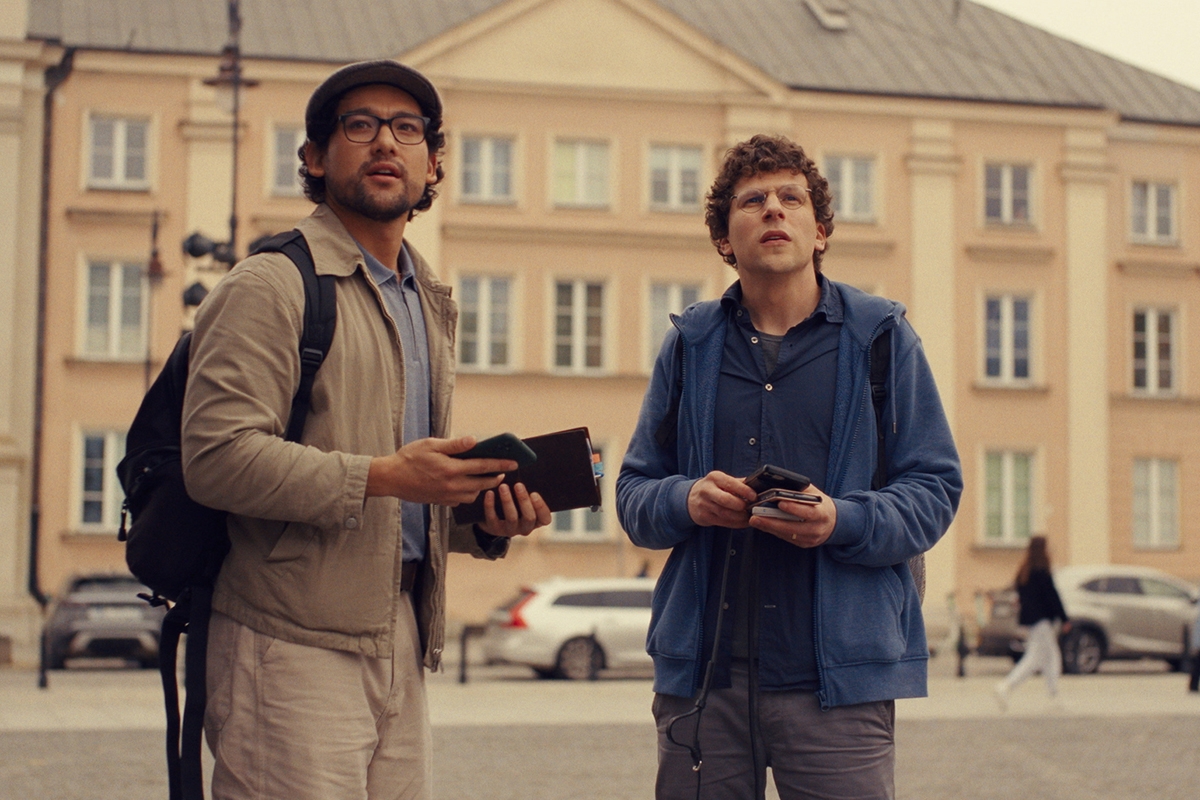
A Real Pain is not Jesse Eisenberg‘s directorial debut, but it will likely be the film to loudly announce his prowess as a writer and director. For any person to write, direct, and star in a film is a massive undertaking, and how prepared the person is for the many responsibilities can make or break the project. Eisenberg is well-prepared, delivering an excellent performance, a sharp and witty script, and apt direction to make one of the best films of the year.
As much as this film is a Jesse Eisenberg vehicle, he might be outshined by his co-star Kiernan Culkin. Culkin plays Benji, one of two cousins who journey together to Poland after the death of their grandmother to find her hometown and reconnect with their Jewish heritage. Benji is an outgoing, charismatic, and neurotic type, with a huge force of personality. He’s also brash, speaks with raw and uncaring honesty, and is deeply sad and directionless. He’s contrasted against Eisenberg’s David, a reserved and disciplined person who seems to bottle his emotions even as he has it “together” as a successful ad-agent with a caring wife and toddler son.
Culkin’s performance is nothing short of brilliant. He encompasses his character utterly, capturing the dynamic range of a person like this. It is key for performers to embody their characters when much of the film’s drama and comedy focuses on the interplay between the two. Culkin is so dialed into the character that you can’t help but think he personally relates to much of Benji’s dynamic.
While Culkin’s role is indeed excellent, Eisenberg shouldn’t be overlooked. His role may be the less “flashy” one, but he is similarly pitch-perfect. The film provides plenty of big and small opportunities for this character’s anxieties, jealousies, and thoughts to be revealed, culminating in a mid-film monologue that is thoroughly well-delivered and captures a sibling dynamic that should be familiar to many. Eisenberg writes it with raw honesty, and his use of the camera to slowly zoom in on the performance as the dialogue intensifies helps make it a crowning point of the film.
A Real Pain is firmly rooted in exploring Jewish identity. The overt plot mechanics feature a group of Jewish people trying to find a sense of connection to their past, and the characters of Benji and David specifically wrestle with a sort of survivor’s guilty in viewing Holocaust sites and memorials. The film also examines the deep cultural pain the Holocaust inflicted on the Jewish people as well as thinking about when it is and isn’t appropriate to be open about one’s pain or confront it. Eisenberg seems to be drawing on his direct experience as a member of Jewish diaspora in wrestling with his privilege while so many of his forebears suffered so greatly.
The film also carries a dramatic irony and humor that can be described as culturally Jewish. The ending almost feels like one of Jerry Seinfeld’s stand-up bits brought to life in a very low-key manner. It also reminds one of A Serious Man, another film steeped in a Jewish sense of humor as it explores fate. While A Real Pain‘s primary theme could not be described as fate, such ideas are implicit many parts of the film.

It is also a warm film in many ways. The supporting cast all make way for the excellent leads, but they are just as potent in their roles. The script does a great job of making each supporting character distinct and memorable, giving each one some small moments and characterization that make them feel real. The film makes this group seem like the best people to take a tour with, and the sharpness of Will Sharpe‘s narration as a British tour guide help make the film feel like an actual tour of Warsaw, and the authenticity fills your heart.
A Real Pain shines brightly because of how it weaves together humor and drama. The eccentrics of the various characters produce multiple laugh-out-loud moments. But underneath the humor is a film ruminating on how we deal with our pain, handle the dynamics of being both jealous and spiteful towards people we love, and find a sense of meaning in a world that often seems chaotic and uncaring. That Eisenberg explores all of this without any pat endings or resolution, contrived shouting matches between the characters, or any of the falsities that often plague this type of dramas is a testament to his skills in seeing and writing people. It is the type of movie that is highly rewatchable while still conveying plenty of emotional depth.
It is, simply, the best film of the year.
Tell us your thoughts on A Real Pain below and rank it on Flickchart now!!!






